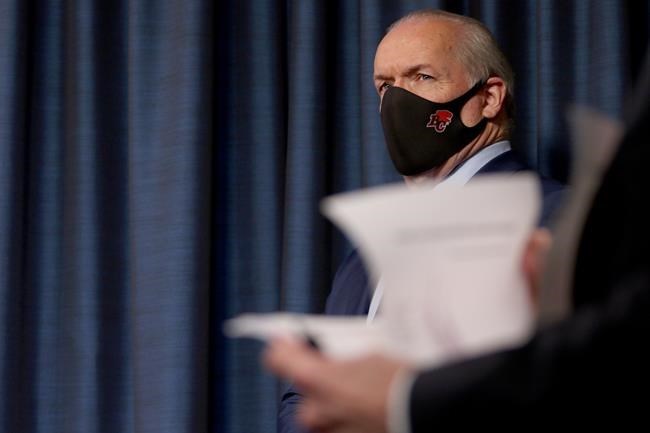VICTORIA — More than 1,400 tourism and hospitality workers who have been laid off or are struggling with reduced hours are set to provide non-clinical help with the COVID-19 immunization rollout in British Columbia.
Premier John Horgan said the province has partnered with 14 hard-hit businesses across the province, including Air Canada, WestJet and the Vancouver International Airport, to help get some of their employees back to work.
These companies have already begun to call and train hundreds of staff, he said, and they will provide their expertise at immunization clinics to help move people through the facilities efficiently and safely, with some using language skills.
"These are challenging times, but they are also inspiring times," he told a news conference Wednesday.
Horgan said other businesses or organizations involved in the partnership include the Vancouver Canucks, Vancouver Giants, Fraser Valley Bandits, Tourism Whistler, Pacific National Exhibition, B.C. Business Council and the B.C. Chamber of Commerce.
Some companies will fully pay their employees' salaries as they work in the clinics, while the province will fill in the gaps for those who aren't paid, Horgan said. He did not specify how much the workers would be paid or how much the program would cost.
Dr. Penny Ballem, who is leading B.C.'s immunization program, said these companies have suffered significantly in the last year and the province is extremely grateful to the tourism employees who have stepped forward to use their skills.
Baljinder Sandhu, a WestJet customer service agent, said she and other airline workers have been deeply impacted by the pandemic. Her hours were reduced from full-time to part-time, so she said she jumped at the opportunity to help in a clinic in Richmond, B.C.
"I was the first to put up my hand," she said. "We want to get B.C. back to normal and our airlines back to normal, and we will do anything to help out."
Ceres Terminals Canada, which operates the cruise port at Vancouver's Canada Place, is also participating in the partnership. Regional vice-president Kathy deLisser said the industry has been hit particularly hard, with a continued ban on cruise ships through 2022.
"Many of our staff were facing another year of unemployment. This partnership has meant that we've been able to employ with our cruise partners over 300 personnel and counting to be able to work in these clinics," she said.
Horgan was asked about proposed legislation in the U.S. that would allow cruise ships to bypass B.C. He said he doubted it would pass, but he has been in touch with the government south of the border and will reach out to the Alaska governor's office on the issue.
The premier said B.C.'s vaccination program has seen success, but the province has also seen a recent increase in cases, which means residents must continue to follow public health orders.
"All of us are tired of this," he said. "We're just exhausted with COVID-19. But we are not out of the woods yet. We have several more miles to go before we rest."
B.C. announced 716 new cases on Wednesday and three COVID-related deaths for a total of 1,441 fatalities since the pandemic started.
So far, 582,634 vaccines doses have been administered in the province.
Horgan said he expected his government to introduce regulations to require employers to give employees paid time off to get their vaccinations, similar to measures taken by Saskatchewan.
The premier assured residents that immunizations would remain on track despite the European Union holding back shipments of Moderna and Pfizer-BioNTech doses, as well as a Reuters report that said India is freezing major exports of the Oxford-AstraZeneca vaccine.
Horgan said his office spoke with the federal government on both issues on Wednesday and received assurances that it is "full steam ahead," though he added that B.C. will continue to be prudent and strategic with scarce resources of vaccine.
Some 85 per cent of residents in Prince Rupert and Port Edward have now been vaccinated in a whole-of-community approach due to high case numbers, and teachers in the Surrey school district will soon be immunized because of their vulnerability, he said.
The province also announced Tuesday that some 200,000 people with medical conditions that make them "extremely clinically vulnerable" to COVID-19 will be eligible to get the shot sooner than expected. Those who have been selected will receive letters in the mail and be able to book their shots starting Monday.
It has also moved up the timeline for seniors, with 76-year-olds able to start booking their appointments on Wednesday, 75-year-olds on Thursday and 74-year-olds on Friday.
"It does us no purpose, no purpose whatsoever, to lament what could be," Horgan said. "Rather, we need to focus on what is."
— By Laura Dhillon Kane in Vancouver
This report by The Canadian Press was first published March 24, 2021.
The Canadian Press



